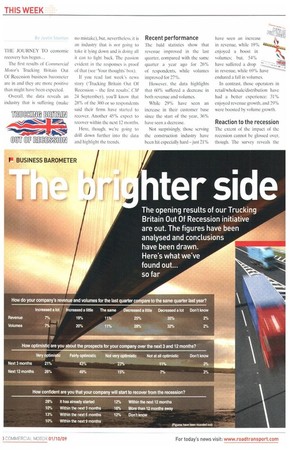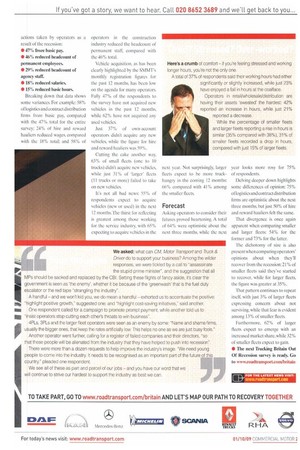THE JOURNEY TO economic recovery has begun...
Page 20

Page 21

If you've noticed an error in this article please click here to report it so we can fix it.
The first results of Commercial Motor's Trucking Britain Out Of Recession business barometer are in and they are more positive than might have been expected.
Overall, the data reveals an industry that is suffering (make no mistake), but, nevertheless, it is an industry that is not going to take it lying down and is doing all it can to tight back. The passion evident in the responses is proof of that (see 'Your thoughts' box).
If you read last week's news story ('Trucking Britain Out Of Recession — the first results: CM 24 September), you'll know that 28% of the 300 or so respondents said their firms have started to recover. Another 45% expect to recover within the next 12 months.
Here, though, we're going to drill down further into the data and highlight the trends.
Recent performance
The bald statistics show that revenue improved in the last quarter, compared with the same quarter a year ago for 26% of respondents, while volumes improved for 27%.
However, the data highlights that 60% suffered a decrease in both revenue and volumes
While 29% have seen an increase in their customer base since the start of the year, 36% have seen a decrease.
Not surprisingly, those serving the construction industry have been hit especially hard —just 21%
have seen an increase in revenue, while 19% enjoyed a boost in volumes; but, 548V
have suffered a drop • —. in revenue, while 69% have endured a fall in volumes.
In contrast, those operators in retail/wholesale/distribution have had a better experience: 31% enjoyed revenue growth, and 29% were boosted by volume growth.
Reaction to the recession
The extent of the impact of the recession cannot be glossed over, though. The survey reveals the actions taken by operators as a result of the recession: • 47% froze basic pay.
• 46% reduced headcount of permanent employees.
• 29% reduced headcount of agency staff.
• 18% reduced salaries.
• 15% reduced basic hours.
Breaking down that data shows some variances. For example: 58% of logistics and contract distribution firms froze basic pay, compared with the 47% total for the entire survey: 24% of hire and reward hauliers reduced wages, compared with the 18% total; and 58% of operators in the construction industry reduced the headcount of permanent staff, compared with the 46% total.
Vehicle acquisition, as has been clearly highlighted by the SMMT's monthly registration figures for the past 12 months, has been low on the agenda for many operators. Fully 47% of the respondents to the survey have not acquired new vehicles in the past 12 months, while 62% have not acquired any used vehicles.
Just 37% of own-account operators didn't acquire any new vehicles, while the figure for hire and reward hauliers was 59%.
Cutting the cake another way, 63% of small fleets (one to 10 trucks) didn't acquire new vehicles, while just 31% of larger' fleets (11 trucks or more) failed to take on new vehicles.
It's not all had news: 55% of respondents expect to acquire vehicles (new or used) in the next 12 months. The thirst for reflecting is greatest among those working for the service industry, with 65% expecting to acquire vehicles in the next year. Not surprisingly, larger fleets expect to be more truckhungry in the coming 12 months: 66% compared with 41% among the smaller fleets.
Forecast
Asking operators to consider their futures proved heartening. A total of 64% were. optimistic about the next three months, while the next year looks more rosy for 75% of respondents.
Delving deeper down highlights some differences of opinion: 75% of logistics and contract distribution firms are optimistic about the next three months, but just 50% of hire and reward hauliers felt the same.
That divergence is once again apparent when comparing smaller and larger fleets: 54% for the former and 73% for the latter.
The dichotomy of size is also presen t when comparing operators' opinions about when they'll recover from the recession: 21% of smaller fleets said they've started to recover, while for larger fleets, the figure was greater at 35%.
That pattern continues to repeat itself, with just 3% of larger fleets expressing concern about not surviving, while that fear is evident among 13% of smaller fleets.
Furthermore. 62% of larger fleets expect to emerge with an increased market share, while 32% of smaller fleets expect to gain.
• The next Trucking Britain Out Of Recession survey is ready. Co to www.roadtranspori.com/britain












































































































































